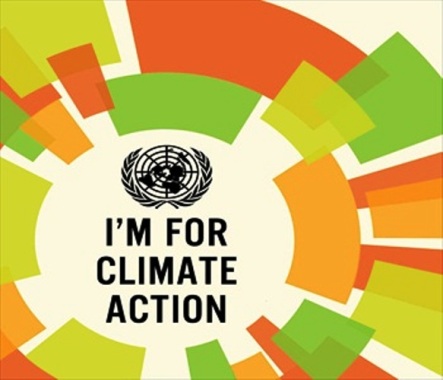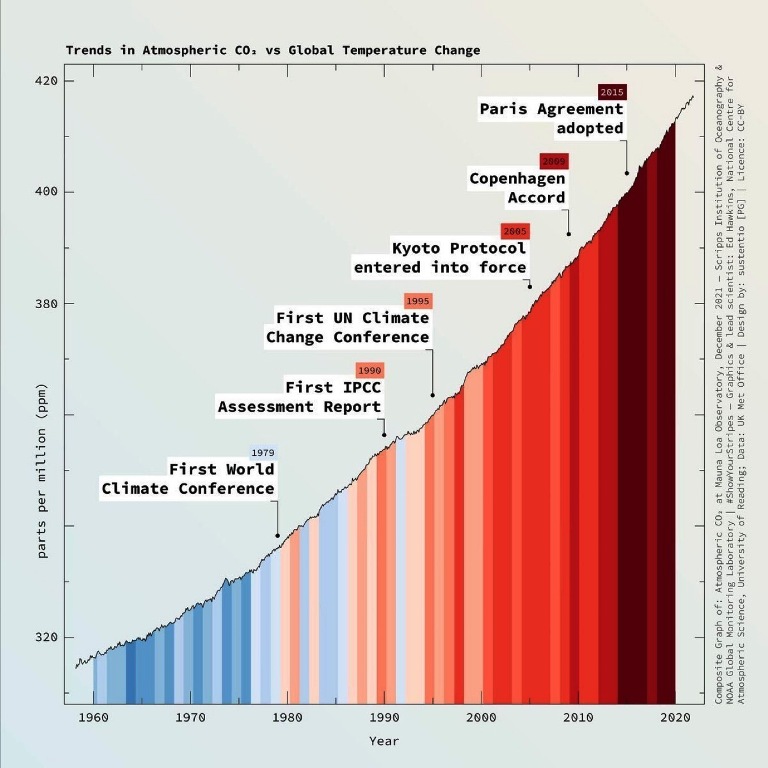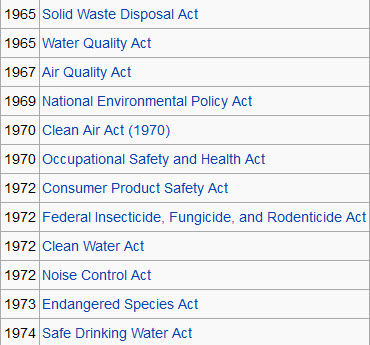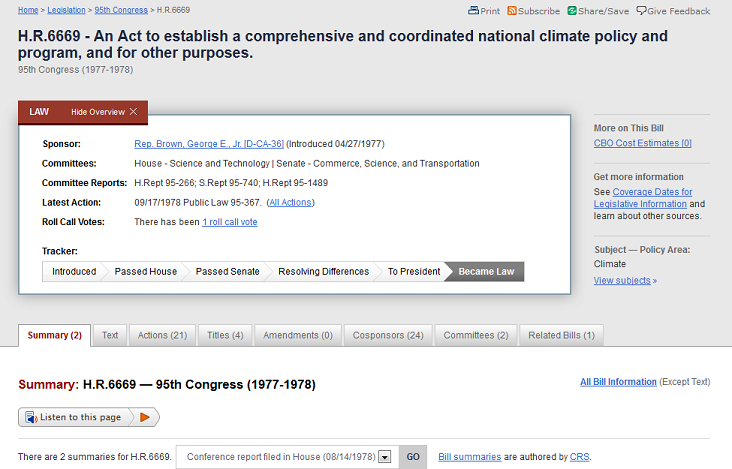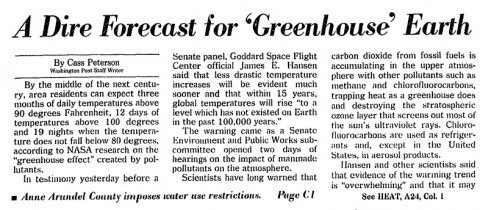Ethics and Climate Change
Climate Action: An Ethical Responsibility
- Beyond Preparing for Crisis Management
In 1977, the head of the US National Oceanic and Atmospheric Administration delivered a report for the National Academy of Sciences that concluded that CO2 released during the burning of fossil fuel could have consequences for climate that pose a considerable threat to future society.
Energy & Climate (1977) warning of the National Academy of Sciences
1979
In 1979 a follow-on National Science Academy report, commonly referenced as the "Charney Report", is released. The study was "in response to a request from the Director of the recently established Office of Science and Technology Policy" and it stated that "the President of the National Academy of Sciences (has) convened a study group under the auspices of the Climate Research Board of the National Research Council to assess the scientific basis for projection of possible future climatic changes resulting from man-made releases of carbon dioxide into the atmosphere." This study and report of national scientists is now seen as prescient and accurate in its global warming predictions.
Note the featuring of J. Hansen, Goddard Institute for Space Studies, NASA and S. Manabe, R.T. Wetherald, and K.Bryan, Geophysical Fluid Dynamics Laboratory, NOAA. The Chairman of the Study Group on Carbon Dioxide and Climate is Jule G. Charney (who years later would write of the report's accuracy in its predictions)
"[T]he responsibility of the carbon-dioxide problem is ours - we should accept it and act in a way that recognizes our role as trustees for future generations." (Charney et al., 1979) This report also estimated that the amount of warming that would be experienced from a doubling of the pre-industrial levels of CO2 would be 3 degrees C, very close to the amount that the "Intergovernmental Panel on Climate Change" would predict almost 30 years later."
In Geneva, Switzerland, a 'World Climate Conference' convened in 1979 under the aegis of the World Meteorological Organization, a weather and science agency of the United Nations.
"Climate Declaration"
The DECLARATION OF THE WORLD CLIMATE CONFERENCE
The World Climate Conference, a conference of experts on climate and mankind, held in Geneva, from 12 to 23 February 1979, was sponsored by the World Meteorological Organization in collaboration with other international bodies.
The specialists from many disciplines assembled for the Conference expressed their views concerning climatic variability and change and the implications for the world community. On the basis of their deliberations, they adopted the following: "An Appeal to Nations"
More on Climate and the World Meteorological Organization (WMO)
EthicsandClimate.org
The Ethics and Climate site contains over 185 articles (as of 2017) including 13 videos on ethical issues raised by climate change. The site seeks to help policy makers and interested citizens understand the ethical dimensions of climate change issues in contention in policy debates.
For over thirty-five years, the US Academy of Sciences has warned the US about the enormous threats of climate change with each successive report making stronger claims that human caused climate change is a serious threat to civilization. If the United States can be accused of failing to live up to its ethical responsibilities to the rest of the world on climate change, one cannot blame the US Academy of Sciences for failing to ring alarm bells. US citizens cannot claim that their most prestigious scientific institutions have failed to take a position on the seriousness of climate change.
The failure of the United States to respond to climate change can be attributed in largest part to a well-financed, well-organized climate change disinformation campaign. As Climate Ethics has previously cited, see "A New Kind of Crime Against Humanity?: The Fossil Fuel Industry's Disinformation Campaign On Climate Change". (Donald Brown, 2010a)
Climate Ethics has also repeatedly argued that the failure of the United States to respond to its ethical duties for climate change may also be attributed to the almost complete failure in the United States of the media and even climate change policy advocates to acknowledge that climate change raises not only national interests but also duties, responsibilities, and obligations to others.
Ethics and The National Academy of Sciences
If climate change must be understood as a civilization challenging ethical issue, can the US Academy reports on climate change be criticized on ethical grounds?
The US Academy reports acknowledge that climate change has serious adverse world-wide impacts, that is impacts outside the United States. For instance, in its most recent report, the US Academy concluded that climate change would cause the following world-wide impacts:
• Water availability will decrease in many areas that are already drought-prone and in areas where rivers are fed by glaciers or snowpack;
• A higher fraction of rainfall will fall in the form of heavy precipitation, increasing the risk of flooding and, in some regions, the spread of water-borne illness;
• People and ecosystems in coastal zones will be exposed to higher storm surges, intrusion of salt water into freshwater aquifers, and other risks as sea levels rise;
• Coral reefs will experience widespread bleaching as a result of increasing temperatures, rising sea levels, and ocean acidification.
○ ○ ○ ○ ○ ○ ○ ○ ○ ○ ○ ○
In the UK
- https://www.wired.com/story/meet-the-amateur-scientist-who-discovered-climate-change/ -- About Guy Callendar
In the US
Can our environment be saved? George E. Brown speaks to the US House of Representatives, 1969
Congressman Brown / Out in Front of Climate Action
National Climate Program Act, 1978 / PDF
Drafted by Congressman Brown, the first federal climate legislation and scientific program to study and act on climate change - global warming.
○ ○ ○ ○ ○ ○ ○ ○ ○ ○ ○ ○
The Initial US Climate Study/Report: Historic
Energy and Climate Report, 1977, National Academy of Sciences / 175 pp. / PDF via GreenPolicy360
○ ○ ○ ○ ○ ○ ○ ○ ○ ○ ○ ○
James Hansen's Warning to Congress in 1988:
- Ten years after the National Climate Program Act was drafted by Representative Brown and the legislation's passage led by the Congressman began the federal government's study of climate change, impacts and risks.
- http://www.greenpolicy360.net/w/File:Hansen-testimony-1988.jpg
○
- Anthropocene
- Arctic
- Atmospheric Science
- Climate Change
- Climate Policy
- Desertification
- Digital Citizen
- Earth Observations
- Earth360
- Earth Science
- Earth Science from Space
- Ecology Studies
- Eco-ethics
- Eco-nomics
- Eco-Theology
- Education
- Energy
- Environmental Laws
- Environmental Protection
- Environmental Security
- Environmental Security, National Security
- Extinction
- Greenland
- Global Security
- Global Warming
- Green Networking
- Green Politics
- INDC
- NASA
- NOAA
- Natural Resources
- Networking
- New Definitions of National Security
- Ocean Science
- Planet Citizen
- Renewable Energy
- Resilience
- Sea-level Rise
- Sea-Level Rise & Mitigation
- Solar Energy
- Strategic Demands
- Sustainability Policies
- US
- US Environmental Protection Agency
- Whole Earth
- Wind Energy
